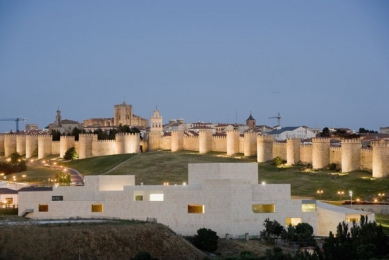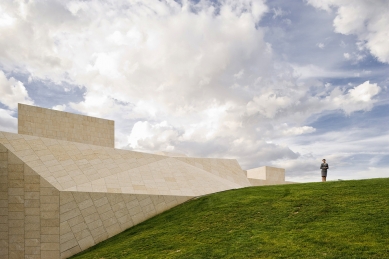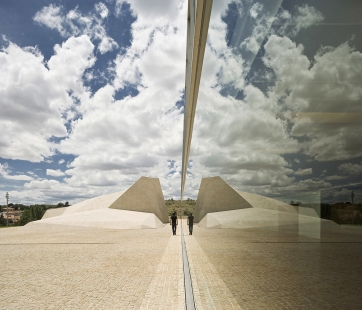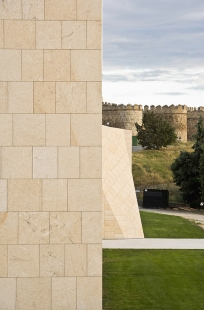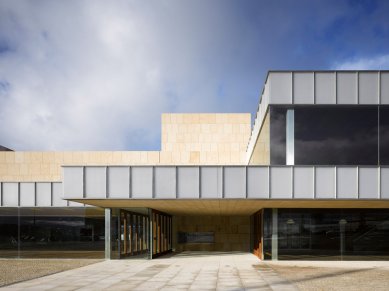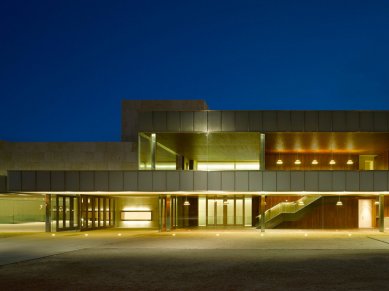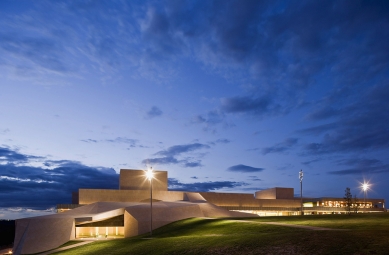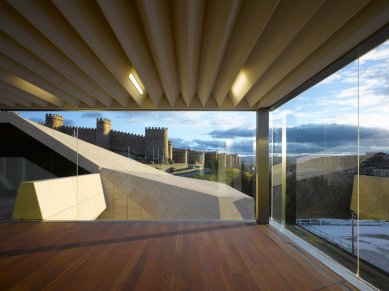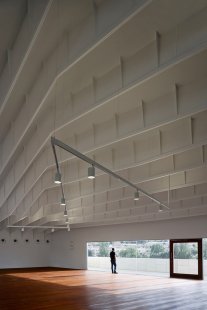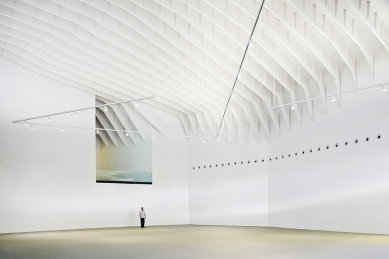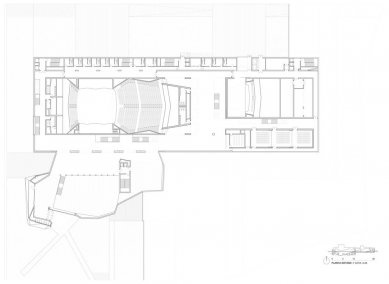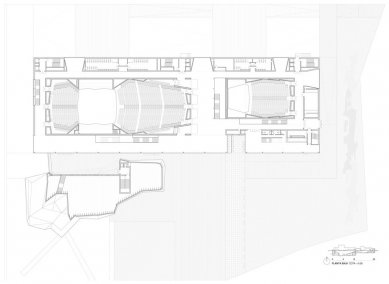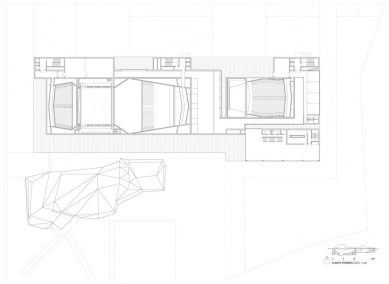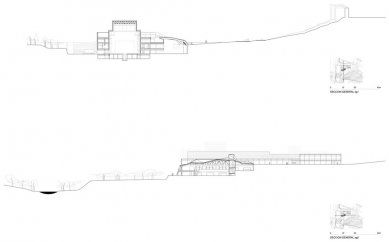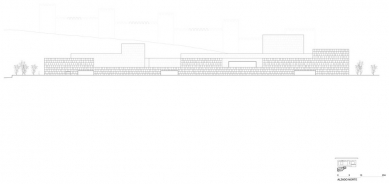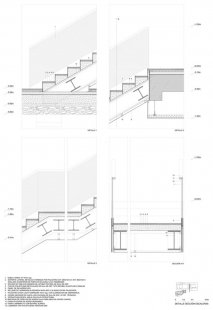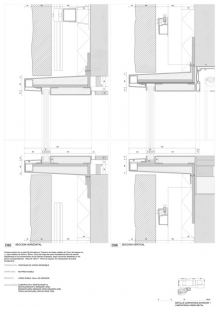
Ávila Congress and Exhibitions Municipal Centre

"The project combines two different geometries: the most orthogonal and elongated space contains the auditoriums and main halls, while the most precipitous and uneven one contains the exhibition spaces… the project draws inspiration from the evocative strength of the landscape, from the granitic mass which pervades everything. Seen from afar, and high up on the walls, the building should reveal no planes, but rather leave a volumetric imprint, as a sculpture carved out of the terrain."
Ávila is a dense and intense city. Surrounded by walls which have served to delimit and control its growth, every corner, every building and every framed view that derives from the sinuous tracing of its streets comes to highlight this perception. However, there is another density, a more intuitive one, which has to do with the quality of the land itself: a topographical, mineral compactness whose presence is revealed in a superb landscape sprinkled by granite stones which struggle to emerge and finally manage to do so in the artificial form of city walls. Ávila itself is a rock amid the harsh landscape surrounding it.
Within such thickset contexts, any clear space takes on an added value much related to the concept of contrast or of boundary. In such cases a square serves as a means to free up interior space, and externally, to articulate the relationship with the city walls. The area outside the walls, usually linked to commercial activity, belies the origin of these voids which organize the space between the city inside, and the city outside. These areas which have managed to remain clear have earned the power to structure the city in the course of the years. The presence of an open space at the foot of the walls – once a river bed and later a cattle market –, where the new Congress Center shall go up, allows to think of new systems to structure the urban space.
The site is characterized by the deep slope and the subsoil, which at least in the designated construction area, is granitic, thereby making excavation difficult. During project design the guiding principles were conceptual density, generosity in the way of occupying space, and exploitation of the topographical features of the site. The landscape, studded with granite pieces, provided the references needed.
The Municipal Congress and Exhibition Center is aimed at becoming a meeting place to celebrate different kinds of events, a leveled area or plaza at the edge of the walls. The main level of this area is matched up with the highest point of the plot, so that its extension generates a large interior void that shall house, without excavation, the required functions. This ensures that the new constructions, in spite of the scale of the programs they serve, do not stand out disproportionately. As it nears the river, this leveled area adjusts with polyhedric folds to the lowest parts of the plot. However, the grounds where the building rests remain as a raised platform which allows to establish a visual relationship with the opposite bank and the river itself.
In accordance with the contours of the site, the project combines two different geometries: the most orthogonal and elongated space contains the auditoriums and main halls, while the most precipitous and uneven one contains the exhibition spaces. Entry to the complex is clear and easy: the main auditoriums are reached from the square and from the higher part of the seating area, which allows to get a quick grasp of the interior space; and the exhibition areas have an independent entrance from the incisions on the platform in the eastern boundary and, since all the different areas are connected under the square, they can also be reached from inside the building. The exhibition halls of these levels are set out as extensions of the foyer areas. All public accesses concentrate at the square, whereas the service areas are located in the northern end, where the slope of the terrain has been maintained.
From a formal and constructional point of view, the project draws inspiration from the evocative strength of the landscape, from the granitic mass which pervades everything. Seen from afar, and high up on the walls, the building should reveal no planes, but rather leave a volumetric imprint, as a sculpture carved out of the terrain. For this reason the roofs shall be designed to smoothly extend the vertical surfaces. The elongated, more orthogonal building is precisely sculpted; and the more abrupt piece which covers the exhibition areas is built by tilting the base of the square, and then spreads to meet the surrounding landscape. These folds generate the incisions through which natural light floods the interior, also allowing independent access to this area. Instead of thin cladding, thick granite pieces shall be used.
In keeping with the exterior treatment of the pieces, the interior halls will be clad in laminated glass with a fiberglass infill, generating a dense and mineral – rather than transparent – appearance.
Francisco Mangado
Ávila is a dense and intense city. Surrounded by walls which have served to delimit and control its growth, every corner, every building and every framed view that derives from the sinuous tracing of its streets comes to highlight this perception. However, there is another density, a more intuitive one, which has to do with the quality of the land itself: a topographical, mineral compactness whose presence is revealed in a superb landscape sprinkled by granite stones which struggle to emerge and finally manage to do so in the artificial form of city walls. Ávila itself is a rock amid the harsh landscape surrounding it.
Within such thickset contexts, any clear space takes on an added value much related to the concept of contrast or of boundary. In such cases a square serves as a means to free up interior space, and externally, to articulate the relationship with the city walls. The area outside the walls, usually linked to commercial activity, belies the origin of these voids which organize the space between the city inside, and the city outside. These areas which have managed to remain clear have earned the power to structure the city in the course of the years. The presence of an open space at the foot of the walls – once a river bed and later a cattle market –, where the new Congress Center shall go up, allows to think of new systems to structure the urban space.
The site is characterized by the deep slope and the subsoil, which at least in the designated construction area, is granitic, thereby making excavation difficult. During project design the guiding principles were conceptual density, generosity in the way of occupying space, and exploitation of the topographical features of the site. The landscape, studded with granite pieces, provided the references needed.
The Municipal Congress and Exhibition Center is aimed at becoming a meeting place to celebrate different kinds of events, a leveled area or plaza at the edge of the walls. The main level of this area is matched up with the highest point of the plot, so that its extension generates a large interior void that shall house, without excavation, the required functions. This ensures that the new constructions, in spite of the scale of the programs they serve, do not stand out disproportionately. As it nears the river, this leveled area adjusts with polyhedric folds to the lowest parts of the plot. However, the grounds where the building rests remain as a raised platform which allows to establish a visual relationship with the opposite bank and the river itself.
In accordance with the contours of the site, the project combines two different geometries: the most orthogonal and elongated space contains the auditoriums and main halls, while the most precipitous and uneven one contains the exhibition spaces. Entry to the complex is clear and easy: the main auditoriums are reached from the square and from the higher part of the seating area, which allows to get a quick grasp of the interior space; and the exhibition areas have an independent entrance from the incisions on the platform in the eastern boundary and, since all the different areas are connected under the square, they can also be reached from inside the building. The exhibition halls of these levels are set out as extensions of the foyer areas. All public accesses concentrate at the square, whereas the service areas are located in the northern end, where the slope of the terrain has been maintained.
From a formal and constructional point of view, the project draws inspiration from the evocative strength of the landscape, from the granitic mass which pervades everything. Seen from afar, and high up on the walls, the building should reveal no planes, but rather leave a volumetric imprint, as a sculpture carved out of the terrain. For this reason the roofs shall be designed to smoothly extend the vertical surfaces. The elongated, more orthogonal building is precisely sculpted; and the more abrupt piece which covers the exhibition areas is built by tilting the base of the square, and then spreads to meet the surrounding landscape. These folds generate the incisions through which natural light floods the interior, also allowing independent access to this area. Instead of thin cladding, thick granite pieces shall be used.
In keeping with the exterior treatment of the pieces, the interior halls will be clad in laminated glass with a fiberglass infill, generating a dense and mineral – rather than transparent – appearance.
0 comments
add comment


